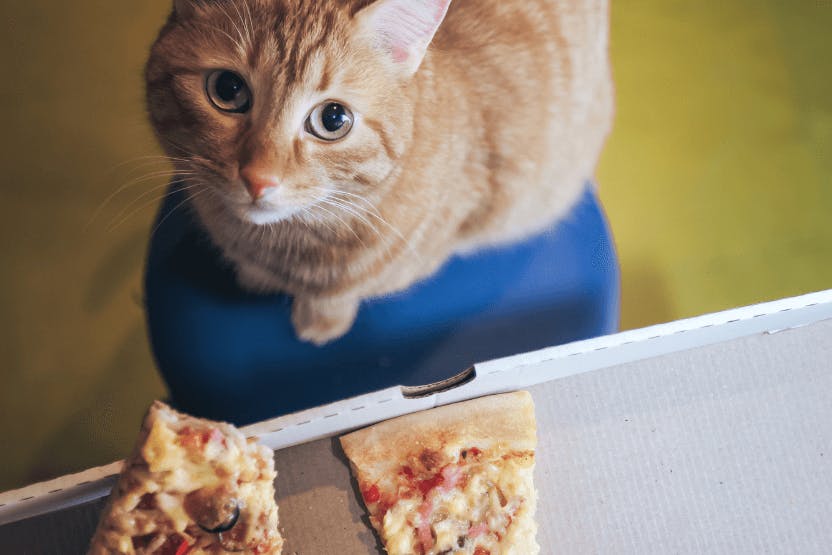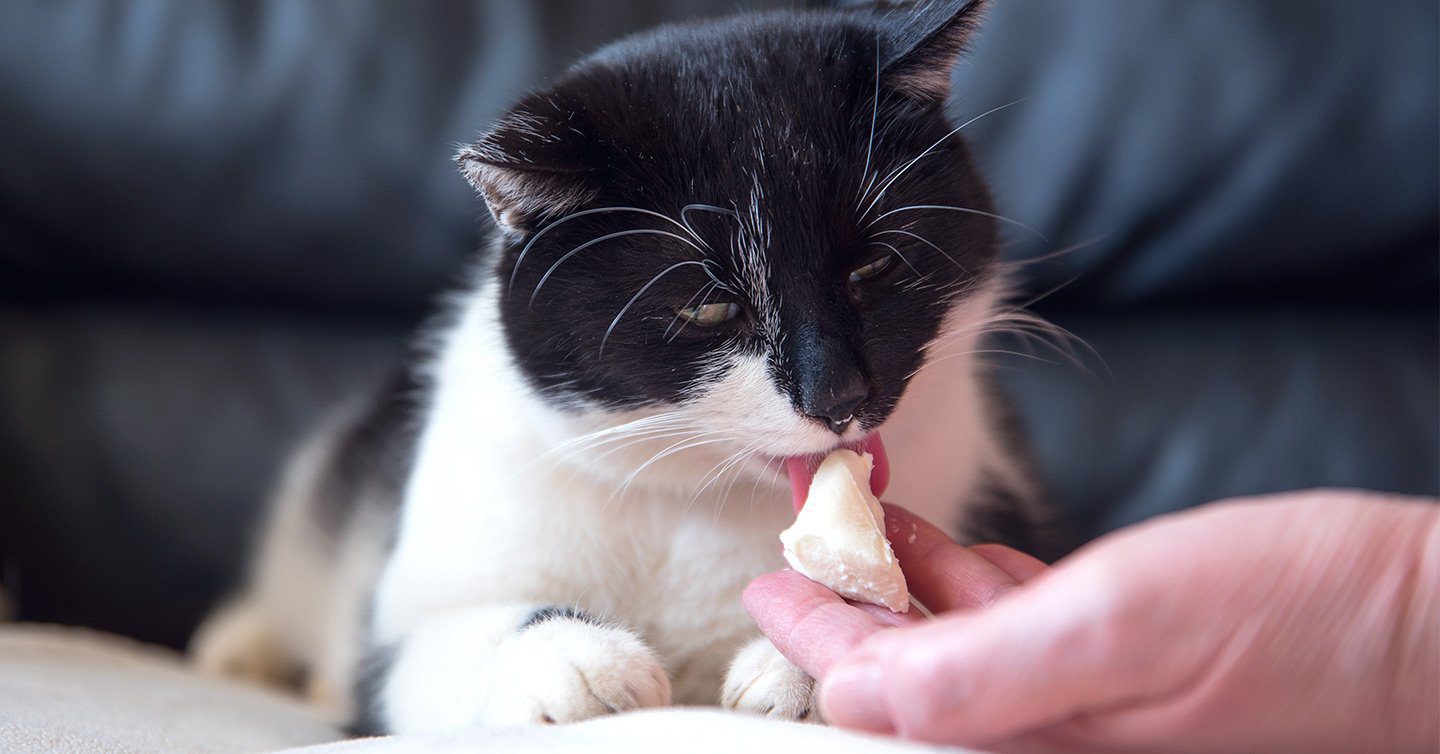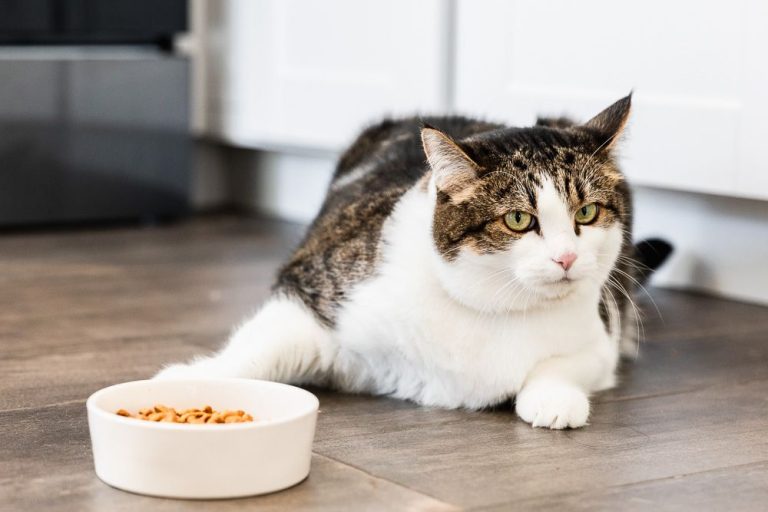Cats can eat cheese as an occasional treat, but only in small amounts due to potential lactose intolerance. Cats can eat cheese, but it should only be given as a rare treat because some cats may be lactose-intolerant.
The lactose in cheese can cause digestive upset, so monitoring your cat’s reaction and offering cheese in small quantities is essential. Additionally, certain types of cheese, such as those high in sodium or seasonings, should be avoided, as they can harm cats.
While cheese can be a tasty snack for cats, it should never replace their complete and balanced diet.

Understanding Cats’ Dietary Needs
As responsible pet owners, paying close attention to our cats’ dietary needs is essential to ensuring their overall health and well-being. Proper nutrition is vital to keeping our feline friends happy and healthy. While cats are obligate carnivores, meaning their natural diet consists mainly of animal protein, they can sometimes exhibit peculiar behaviours when it comes to food, including their curiosity about cheese. In this article, we’ll dive into the topic of whether cats can eat cheese and explore their nutritional needs.
The Nutritional Needs Of Cats
It’s no secret that cats have unique dietary requirements that differ from those of other animals. Being obligate carnivores, cats need a high-protein diet to thrive. Protein is essential for maintaining healthy muscle mass, supporting organ function, and ensuring proper immune system function. Additionally, cats require specific nutrients such as taurine, arachidonic acid, and vitamins like niacin and vitamin A, which are commonly found in animal-based proteins.
Most commercial cat foods are formulated to meet these specific nutritional needs, with carefully balanced amounts of protein, fat, carbohydrates, vitamins, and minerals. These foods are designed to provide a complete and well-rounded diet for our feline companions. However, when it comes to giving cats human food, there can be specific considerations to keep in mind to ensure their health and safety.
Cats And Lactose Intolerance
One of the main concerns regarding cats and cheese is their ability to digest lactose. Like some humans, many cats are lactose intolerant, which means they lack the enzyme lactase needed to properly break down lactose, the sugar found in milk and dairy products. Without enough of this enzyme, cats cannot fully digest lactose, leading to digestive upset.
Feeding cheese to lactose-intolerant cats can result in unpleasant symptoms such as diarrhoea, abdominal pain, and gas. While some cats may have a higher tolerance for lactose, it’s generally advised to minimize or avoid feeding them cheese or any other dairy products altogether, as it’s better to be safe than sorry.
If you’re looking to incorporate treats into your cat’s diet or want to give them something different from their regular meals, plenty of cat-friendly options are available. Specialized cat treats made with high-quality proteins and tailored to their nutritional needs are a safer choice.
In conclusion, while cats may show interest in cheese, it’s important to remember that their dietary needs are different from ours. Cats require a protein-rich diet and can experience digestive issues when fed cheese due to lactose intolerance. It’s always best to consult your veterinarian to determine the most appropriate and safe diet for your furry friend.
Potential Risks Of Feeding Cats Cheese
Feeding cats cheese may pose potential risks to their health. While cheese is not toxic to cats, it is high in fat and lactose, which can lead to digestive issues and obesity. It’s best to consult a veterinarian before giving cats any dairy products.
Cheese And Lactose Intolerance In Cats
Cheese and lactose intolerance in cats are two concepts that go hand in hand. Cats are known to be lactose intolerant, which means they lack the necessary enzyme called lactase to digest lactose, the sugar found in milk and dairy products, properly. Although cheese is a dairy product, it generally contains lower lactose levels than milk. However, it is essential to note that even small amounts of lactose can cause digestive issues in cats. Feeding cheese to lactose-intolerant cats can lead to symptoms such as diarrhea, stomach upset, and even vomiting. It’s crucial to be aware of your cat’s tolerance to lactose and consider alternative treats.
High-fat Content In Cheese
Another potential risk of feeding cats cheese is its high fat content. While cats need a certain amount of fat in their diet, excessive intake can lead to health problems. Cheese is generally high in saturated fats, which can contribute to weight gain and obesity in cats. Obesity in cats can lead to various health issues, including diabetes, heart disease, and joint problems. It is essential to provide a balanced diet for your feline friend and avoid feeding them excessive amounts of high-fat food like cheese to maintain a healthy weight.
Potential Digestive Issues
Feeding cats cheese can result in potential digestive issues. Besides lactose intolerance, cheese can be complex for cats to digest due to its high fat and salt content. The rich and fatty nature of cheese can lead to gastrointestinal upset, including diarrhea and constipation. Moreover, the high salt content in cheese can also cause cat dehydration. Monitoring your cat’s digestion and providing a diet suitable for their specific nutritional needs is crucial. Consulting with a veterinarian about their dietary requirements can help prevent any possible digestive issues associated with cheese consumption.
To summarize, while cats may be attracted to the taste and smell of cheese, it’s essential to be aware of the potential risks involved. Cheese and lactose intolerance in cats, its high-fat content, and the potential digestive issues it may cause should not be overlooked. Opting for cat-friendly treats and a balanced diet recommended by a veterinarian is the best way to ensure your furry friend stays healthy and happy.
Safe Alternatives And Moderation
When feeding cats cheese, it’s important to remember that moderation is vital. While some cats may enjoy the flavour of cheese, it’s not a part of their natural diet. Too much cheese can lead to digestive issues, such as diarrhoea or an upset stomach. However, there are safe alternatives and options for cat owners who want to indulge their feline friends with a cheesy treat. Let’s explore some low-lactose or lactose-free cheese options and other cat-friendly dairy alternatives.
Low-lactose Or Lactose-free Cheese Options
If you’re considering feeding your cat cheese, choosing a low-lactose or lactose-free option is essential. Like some humans, cats can be lactose intolerant, meaning their bodies can’t properly digest lactose, a sugar found in milk and dairy products. Feeding regular cheese to a lactose-intolerant cat can result in gastrointestinal discomfort. Instead, opt for cheese varieties that contain less lactose or are lactose-free. Here are a few examples:
| Cheese Type | Lactose Content |
|---|---|
| Mozzarella | Low lactose |
| Cheddar | Low lactose |
| Swiss | Low lactose |
| Lactose-free cheese | No lactose |
Remember, even with low-lactose or lactose-free options, moderation is still vital. Cats should only be given small amounts of cheese occasionally to prevent any potential digestive upset.
Other Cat-friendly Dairy Alternatives
If you’re looking for dairy alternatives besides cheese, several options are safe and appropriate for cats. Some examples include:
- Plain yoghurt: Cats can enjoy a small amount of plain, unsweetened yogurt as it contains probiotics that can be beneficial for their digestive health.
- Cottage cheese: Like yoghurt, small amounts of plain cottage cheese can be a tasty treat for cats.
- Goat milk is naturally lower in lactose than cow’s milk, making it a suitable option for cats who can tolerate dairy. However, like cheese, it should be given in moderation.
As always, monitoring your cat’s reaction and adjusting their diet are crucial. If you notice any signs of digestive discomfort or adverse reactions, consult your veterinarian.
Feeding Cheese In Moderation
While cheese can be a tempting treat for cats, it’s important to remember that it should only be given in moderation. Cheese is high in fat and calories, leading to weight gain and other health issues if consumed excessively. Additionally, some cats may be more sensitive to the lactose content in cheese, even if it’s low-lactose or lactose-free. To ensure your cat’s well-being, follow these guidelines when feeding cheese:
- Offer cheese only as an occasional treat, not as a regular meal.
- Serve a small amount of cheese, roughly the size of a fingernail.
- Observe your cat for signs of digestive upset, such as vomiting or diarrhoea.
- If your cat shows any adverse reactions or discomfort, discontinue feeding cheese and consult your veterinarian.
Remember, while cheese may seem like an innocent treat, it’s essential to prioritize your cat’s health and well-being. Offering cheese in moderation and exploring alternative options can provide your feline friend with a delightful and safe snacking experience.


Frequently Asked Questions On Can Cats Eat Cheese?
Can Cats Eat Cheese?
Cats can eat small amounts of cheese, but it should not be a regular part of their diet. Some cats may be lactose-intolerant, and eating cheese can cause digestive issues. Cheese should be given as an occasional treat in small quantities to avoid potential health concerns.
Conclusion
Cats can enjoy cheese as an occasional treat, but it should be in moderation. While cheese may be high in fat and lactose, causing digestive issues in some cats, others may tolerate it well. Remember to introduce it slowly and monitor your cat’s reactions.
Consult with your veterinarian to ensure your feline friend’s health and dietary needs are met. A balanced and nutritious cat-specific diet is the key to keeping them healthy and happy.

